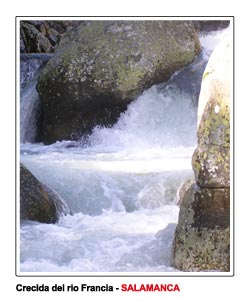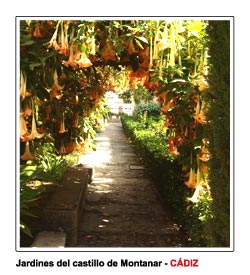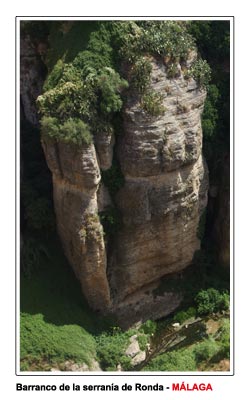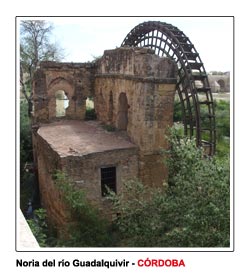
/TOPS-TIT-WUL-M8/ESQUINA-sup-der-30.jpg)
/TOPS-TIT-WUL-M8/TT-conse-40.jpg)
 |
/TOPS-TIT-WUL-M8/ESQUINA-sup-der-30.jpg) |
||
/TOPS-TIT-WUL-M8/TT-conse-40.jpg) |
|||
/MARKS-WUL/MRK-WUL-CELTA/MRK-CELTA-375-20.jpg) |
|||||||
EL CLIMA EN LA PENÍNSULA IBÉRICAPensando en los extranjeros que nos visitan, pero también en los ciudadanos ibéricos despistados, te damos algunas ideas. En los meses de verano (Junio-Septiembre), la península registra temperaturas elevadas , mayores en el interior y más suaves en la costa, al menos una o dos semanas son de “ola de calor”, es decir en ese periodo de 4 a 7 días las temperaturas pueden ser de 40 º C al mediodía en la mitad sur de la península. Pero la península es grande y con muchas particularidades, en verano hemos visto nevar en la cordillera Cantábrica y en los Pirineos, además en la costa mediterránea pueden producirse lluvias cortas pero muy intensas, nunca, repito nunca, aparques en cauces de ríos secos, en verano pueden ser trampas mortales, incluso puede haber fuertes granizadas por casi todo el país. |
 |
WEATHER IN IBERIAN PENINSULAThinking about the foreigners who visit us, but also on some confused Iberian citizens, we give you some general ideas. In the summer months (June-September), usually the Iberian peninsula registers high temperatures, higher in the interior and milder in the coast, at least one or two weeks are of “Heat wave”, so in that period of 4 to 7 days temperatures can be around 40ºC at noon (southern half of Peninsula). But the peninsula is big and has many peculiarities, in summer we have seen snow in the Cantabrian Mountains and in the Pyrenees, in addition in the Mediterranean coast can produce short but very intense rains, never, I repeat never park in channels of dry rivers, in summer can be deadly traps; we even have strong hailstorms all over the country. |
/MARKS-WUL/MRK-WUL-IBERC/MRK-iberic-350-20.jpg) |
|||||||
RECOMENDACIONES POR EL CLIMAEn verano debes detener en cuenta: a) Protectoras (agua, crema solar y gorra) – en toda la península. La hidratación es muy importante, bebe agua (2 litros al día), la orina amarilla u oscura indica deshidratación. b) Informarse de la previsión del clima en informativos. c) Reconocer los síntomas de hipotermia (Montaña) e insolación. d) En suelo mojado cuidado por resbalones. e) Intenta no salir de casa o del hotel en las horas centrales del día en verano (Julio-Agosto). |
 |
RECOMMENDATIONS FOR WHEATHERIn summer you must to consider: A) Protection (water, sun cream and hat), across the peninsula. Hydration is very important, drink water (2 liters a day), yellow or dark urine indicates dehydration. B) Inform you about the forecast of the climate in in-formaives. C) Recognize the symptoms of hypothermia (Mountains) and sunstroke. D) On wet floors, be careful of slips. E) Try don't to leave the house or the hotel, in the central hours of the day in summer (July-August). |
/MARKS-WUL/MRK-WUL-VISIG/MRK-Visigo-400-20.jpg) |
 |
||||||
SENDERISMOSi decides salir al campo o la montaña debes de tener en cuenta unos consejos: a) Comunicación garantizada (móvil cargado) y comunicación a un amigo, familiar o al hotel de tu viaje de la hora de retorno. En España el teléfono de emergencias es el 112. b) Recomendaciones del clima – protectoras (agua, crema solar y sombrero). c) Mejor ir en grupo, no separarse del grupo. d) En la ruta trata de identificar puntos de referencia para evitar perderse. e) Tratar de que no anochezca. f) Mantener ritmo relajado, adaptado a forma física y terreno, calzado y ropa adecuada. g) Respetar la flora y la fauna. |
TREKKINGIf you decide to go out to the country or the mountain, you must take some advice: A) Guaranteed message (mobile charged) and communication to a friend, family or hotel, your travel, and return time. In Spain emergency number is 112. B) Tips for wheather – Protective (water, sun cream and hat). C) Better joined, No separate from group. D) On the route try to identify landmarks to avoid getting lost. E) Try no to get dark. F) Maintain a relaxed march, adapted to the physical shape and terrain. Wear suitable. G) Respect the flora and fauna. |
/MARKS-WUL/MRK-WUL-ROMA/MRK-Roma-300-20.jpg) |
 |
||||||
CONDUCCIÓN ESPAÑA VS PORTUGALEl combustible en Portugal es más caro que en España, algunos ciudadanos portugueses pasan a España para llenar sus vehículos. Los límites de velocidad son iguales en España que en Portugal. 50 Km en ciudad, 90 Km o 100 Km en carretera y 120 en Autopista. Las multas en Portugal deben de pagarse en el acto, para los vehículos de matrícula extranjera, incluso la Guardia Nacional tiene una maquina para que pagues en el acto. En España la policía no obliga a pagar en el acto. En Portugal no se permite aparcar en contra del sentido de la marcha, la multa implica la confiscación del coche 2 meses y un año. |
DRIVING SPAIN VS PORTUGALFuel in Portugal is more expensive than in Spain, some Portuguese citizens pass to Spain to fill their vehicles. The speed limits are the same in Spain as in Portugal: 50 km/h in city, 90 Km/h or 100 Km/h in road and 120 Km/h in Motorway. Fines in Portugal must be paid on the spot (instantly), for cars of foreign number plate, even the National Guard has a machine to pay on the spot. In Spain the police don't force to pay on the spot. In Portugal it isn't allowed to park against the direction of the march, the fine can cause the confiscation of the car 2 months and a year. |
 |
|||||||||||||||
Septiembre de 2017 |
|||||||||||||||
WEB DESARROLLADA POR EXPERTOS EN ARQUEOLOGÍA Y TURISMO - WEB DEVELOPED BY ARCHAEOLOGY & TOURIST EXPERTS |
|||||||||||||||